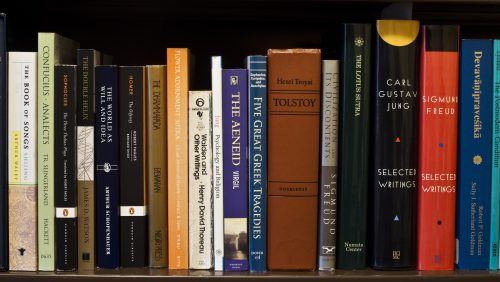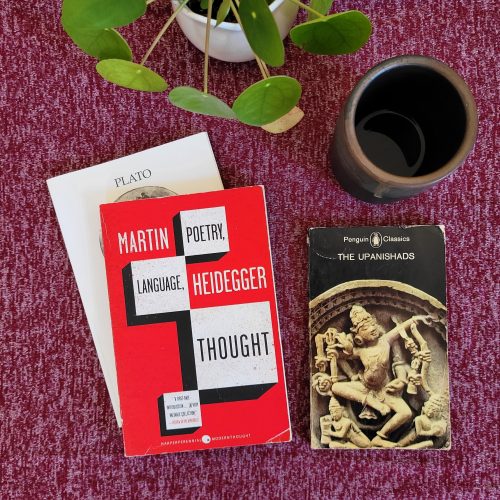Reading List
Bachelors of Arts in Liberal Arts
At the heart of the Bachelor’s Program is our reading list: a selection of classic books from across the world, containing within them over 4000 years of human history and thought. The texts we read span a wide range of subjects, and include significant works from the fields of philosophy, literature, spirituality and religion, psychology, politics, history, math, science, and more.
Our exact reading list does change a little each year. That is because the canon of human thought is constantly growing and evolving, and so our reading list must evolve alongside it. There are many texts, however, that remain significant over time and will likely continue to be included in the program for years to come. Below you will find a selection of some of the texts that you will encounter over the course of your four years in the program.
Freshman Year
- The Sixth Patriarch Sutra
- The Sutra in Forty-two Sections
- The Vimalakirti Sutra
- Selections from the Five Nikayas
- Selections from the Pali Canon
- Confucius, The Analects
- Lao Zi, Dao De Jing
- Selected Works by Mengzi
- Selected Works by Zhuangzi
- Baldwin, “This Nettle, Danger…”
- De Beauvoir, Selections from The Second Sex
- Freud, Civilization and Its Discontents
- Plato, Phaedras
Varies semester by semester
- Yoga
- Guang Ping Yang Taiji
- Piano
- Mixed Media Arts
- Water Color
- Ceramics
- Plant-based Culinary Arts
Sophomore Year
- The Diamond Sutra
- The Heart Sutra
- The Longer Sukhāvatīvyūha Sutra
- The Lotus Sutra
- Shantideva, The Way of the Bodhisattva
- The Sutra on Upasaka Precepts
- Vasubandhu, Shastra on the Door to Understanding the Hundred Dharmas
- Xuanzang, Verses Delineating the Eight Consciousnesses
- Aristotle, Nicomachean Ethics
- Augustine, Confessions
- The Desert Fathers: Sayings of the Early Christian Monks
- Marcus Aurelius, Meditations
- Plato, Five Dialogues: Euthyphro, Apology, Crito, Meno, Phaedo
- Plato, Selections from The Republic
- Plato, Symposium
- Selections from The New Testament
- Aśvaghoṣa, Handsome Nanda
- The Bhagavad Gita
- Harṣa, How the Nagas Were Pleased
- Kālidāsa, Messenger Poems
- Kālidāsa, The Recognition of Śakuntala
- Patanjali, The Yoga Sutra
- The Rig Veda
- The Upanishads
- Vālmīki, The Rāmāyaṇa
- Vyasa, The Mahābhārata
Varies semester by semester
-
- Yoga
- Guang Ping Yang Taiji
- Piano
- Mixed Media Arts
- Water Color
- Ceramics
- Plant-based Culinary Arts
Junior Year
- Ajahn Sumedho, The Sound of Silence
- Bhikkhu Silaratano, Mae Chee Kaew: Her Journey to Spiritual
Awakening & Enlightenment - Red Pine, The Clouds Should Know Me by Now: Buddhist Poet Monks of China
- The Shurangama Sutra
- Therigatha: Verses of the Elder Nuns
- Xuyun, Empty Cloud: The Autobiography of the Chinese Zen Master
- Cervantes, Don Quixote
- Chaucer, Selections from The Canterbury Tales
- Descartes, Meditations on First Philosophy
- Emerson, Self-reliance
- Hobbes, Leviathan
- Hume, An Enquiry Concerning Human Understanding
- Kempis, Selections from The Imitation of Christ
- Plutarch, In Consolation to His Wife
- Shakespeare, Hamlet
- Shelley, Frankenstein
- Tolstoy, How Much Land Does a Man Need?
- Selected writings of Teresa of Avila, Francis of Assisi, Hildegard of
Bingen, and Meister Eckhart - Selected poems of John Donne, Alexander Pope, Dylan Thomas, and Emily Dickinson
- Zengzi, Daxue or Great Learning
- Zisi, Zhongyong or Doctrine of the Mean
- Wu Yubi, The Journal of Wu Yubi: The Path to Sagehood
- Seven Taoist Masters: A Folk Novel of China
- Xiaojing or The Classic of Filial Piety
- Apollonius, Conics
- Descartes, Geometry
- Euclid, Elements
- Newton, Principia Mathematica
- Pascal, Generation of Conic Sections
- Viete, Introduction to the Analytical Art
- Archimedes, On the Equilibrium of Planes
- Archimedes, On Floating Bodies
- Aristotle, On the Parts of Animals
- Aristotle, On the Soul
- Aristotle, Physics
- Darwin, On the Origin of Species
- Einstein, Relativity
- Galileo, Dialogue Concerning the Two Chief World Systems
- Galileo, The Starry Messenger
- Goethe, Metamorphosis of Plants
- Lamarck, Zoological Philosophy
- Linnaeus, Systema Naturae
- Lucretius, On the Nature of Things
- Morgan, “On the Mechanism of Heredity”
- Mendel, “Experiments with Plant Hybrids”
- Pascal, On the Equilibrium of Liquids
- Plato, Timaeus
- Ptolemy, Almagest
- Sun Simiao, On the Sublime Sincerity of the Eminent Physician
- Selected writings by Charles-Augustin de Coulomb, Alessandro Volta, André-Marie Ampère, Theodor Schwann, Francis Bacon, Erwin Schrödinger, Werner Heisenberg, and Richard Feynman
Varies semester by semester
-
- Yoga
- Guang Ping Yang Taiji
- Piano
- Mixed Media Arts
- Water Color
- Ceramics
- Plant-based Culinary Arts
Senior Year
- The Avatamsaka Sutra
- The Mahaparinirvana Sutra
- Beckett, Waiting for Godot
- Butler, “Performative Acts and Gender Constitution”
- Dostoevsky, Notes from Underground
- Eliot, Middlemarch
- Heidegger, Discourse on Thinking
- James, Selections from Pragmatism
- Lyotard, The Postmodern Condition: A Report on Knowledge
- Marx, “Manifesto of the Communist Party”
- Nietzsche, Selections from All Too Human
- Woolf, To the Lighthouse
- Abhinavagupta, Paramārthasāra
- The Devi Mahatmya
- Gupta, The Gospel of Sri Ramakrishna
- Jaini, The Jaina Path of Purification
- Khan, The Heart of Sufism
- Mirabai, Ecstatic Poems
- Sanai, The Enclosed Garden of the Truth
- Swami Vivekananda, The Complete Works
- Selections from The Holy Quran
- Selected Poems of Rumi, Kabir, Ghalib
- Irigaray, To Be Born
- Nietzsche, “On Truth and Lies in a Nonmoral Sense”
- Plato, Phaedrus
- Short Stories by Virigina Woolf, Franz Kafka, Jorge Luis Borges

